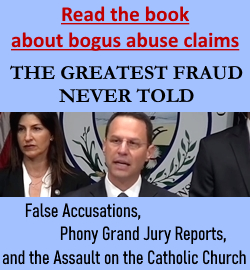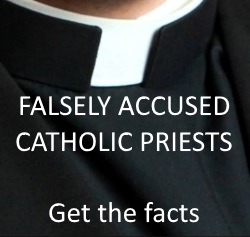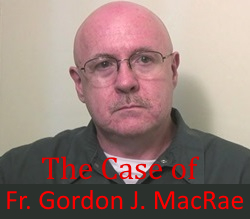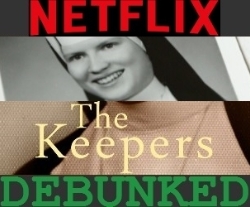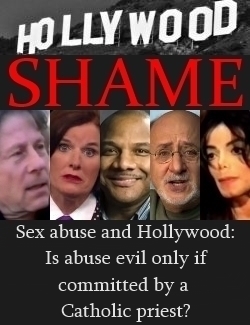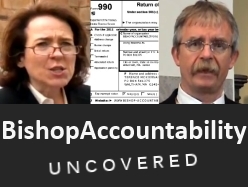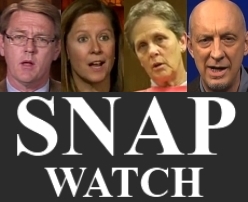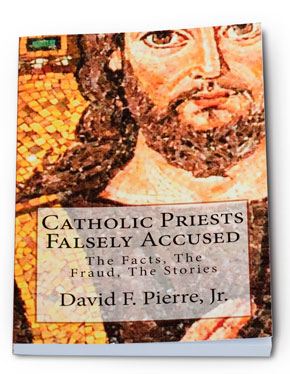Many individuals have come forward publicly to claim that a priest molested them years earlier (and often decades earlier) after asserting that they “repressed” the memory of the abuse having occurred.
Unfortunately, the media has been woefully uncritical when reporting cases in which an individual invokes “repressed memory” when claiming abuse by a priest from decades earlier.
Dr. Richard J. McNally is the Professor and Director of Clinical Training in the Department of Psychology at Harvard University. As one of the world’s leading experts in the field of memory, he has 250 publications to his credit, including the heralded 2003 book, Remembering Trauma.
In a 2005 letter to the California Supreme Court, which was handling a case in which “repressed memory” was debated, Dr. McNally asserted:
“The notion that traumatic events can be repressed and later recovered is the most pernicious bit of folklore ever to infect psychology and psychiatry. It has provided the theoretical basis for ‘recovered memory therapy’ — the worst catastrophe to befall the mental health field since the lobotomy era.”
Many other prominent experts agree. “Repressed memory” is simply bogus.
Dr. Grant Devilly, from the Psychological Health research unit at Griffith University, agrees with Dr. McNally. Devilly says that memories of terrifying experiences work in the opposite manner of repressed memory theory. People rather wish they could forget their traumatic experiences.
“It’s the opposite. They wish they couldn’t think about it,” says Devilly.
Then there is Dr. James McGaugh from the University of California, Irvine. His expertise in the area of memory was once profiled on CBS’ 60 Minutes program. Regarding the issue of “repressed memory,” Dr. McGaugh said in a 2010 book,
“I do not believe there’s such a thing as repressed memory. I haven’t seen a single instance in which a memory was completely repressed and popped up again.
“I go on science, not fads. And there’s absolutely no proof that it can happen. Zero. None. Niente. Nada. All my research says that strong emotional experiences leave emotionally strong memories. Being sexually molested would certainly qualify.”
In addition:
- "Recovered-memory therapy will come to be recognized as the quackery of the 20th century." – Dr. Richard Ofshe, a social psychologist at the University of California, Berkeley (Leon Jaroff and Jeanne McDowell, “Repressed-Memory Therapy: Lies of the Mind,” Time, November 29, 1993);
- "If penis envy made us look dumb, this will make us look totally gullible." – Dr. Paul McHugh, chairman of the psychiatry department at Johns Hopkins University (Leon Jaroff and Jeanne McDowell, “Repressed-Memory Therapy: Lies of the Mind,” Time, November 29, 1993);
- "You can’t be raped for 10 years and not remember it. Yet, according to the repression aficionados, anything's possible." – Dr. Elizabeth Loftus, professor of psychology at the University of California Irvine (Sasha Abramsky, “Memory and Manipulation: The trials of Elizabeth Loftus, defender of the wrongly accused,” LA Weekly, August 19, 2004).
Indeed, this is an issue that must be approached with caution and sensitivity. Not all clergy abuse victims invoke “repressed memory.” The memory of actual awful abuse is all too real and devastating.
“Repressed memory” should not be confused with instances in which an abused individual minimizes the awful harm that was done and comes to the harsh realization later in life of having been abused. Indeed, as Harvard’s Dr. McNally has explained, many victims only come to the understanding of the damage done to them years later after reassessing their hideous experiences. There can be intense suffering when victims reexamine their childhood abuse later in life.
“Seeing the event through the eyes of adult, they realize what has happened to them and now they experience the emotional turmoil of trauma,” says Dr. McNally. The trauma is equivalent to post-traumatic stress disorder (PTSD). Fortunately, therapy under the direction of a competent psychologist has been shown to be very helpful to victims of PTSD.
“Things have changed, happily. We now have treatments that work,” adds Dr. McNally.
One final note: It is important to know that in the rare moments that “repressed memory” is challenged in the media, victim advocates will vehemently and vocally complain to writers and editors who dare to challenge the bogus theory. Such attackers will falsely claim that there is a legitimate “other side” to this issue. There isn’t. The public should be very aware of this.
To repeat the words of Dr. McNally, “repressed memory therapy” is indeed “the worst catastrophe to befall the mental health field since the lobotomy era.”
[See also: "Minn. Supreme Court Rejects 'Repressed Memory' Junk Science Against Priest, Media Yawns" (July 2012)]
